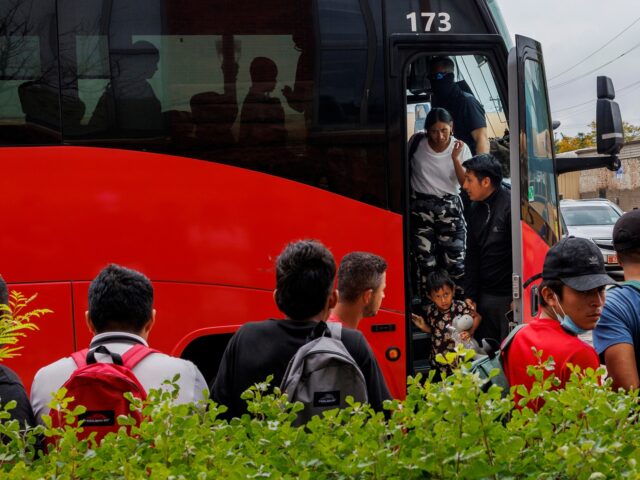At least two Chicago area suburbs have passed new ordinances prohibiting bus companies from dropping off illegal aliens in their towns as the area becomes an increasing target for newly arriving border crossers, even as other towns begin to accept large amounts of money in state and federal programs to help care for migrants.
The two towns moving to oppose more illegals include north west suburban Rosemont and the western suburb of Cicero, the Chicago Tribune reported.
Over the past week, buses arrived in the two towns but were told by police to move along in both towns due to recently passed city ordinances prohibiting passengers being dropped off from buses unless they have a specific destination.
Two Chicago suburbs rejected busloads of immigrants that arrived from El Paso, Texas, over the past week as the city and Illinois as a whole continue to face an influx of illegal immigrants from the southern border.
— Viral News NYC (@ViralNewsNYC) December 13, 2023
Several buses arrived at the Metra stations in Cicero,… pic.twitter.com/rGVZGN0yhq
The buses, reportedly from El Paso, Texas, arrived in an O’Hare International Airport remote parking lot in Rosemont where police threatened to impound the vehicles if they let their passengers disembark. The town council approved an ordinance on Dec. 11 prohibiting such drop offs.
Buses were also turned away at a Metra station in Cicero, where city officials have approved a measure to fine bus companies $750 a person for dropping off homeless migrants in the city limits.
“It’s wrong to drop people on the street with nowhere to go,” Cicero town spokesman Ray Hanania said. “We think every community should do this to prevent this. They need to force the state to come up with a better plan for homeless people.”
Neither Rosemont nor Cicero are “sanctuary” cities. But both cities find their borders compromised since both the city of Chicago, upon which they border, and the County of Cook have adopted sanctuary rules to varying degrees.
Suburbs are also taking other measures to prevent migrants from inundating them.
Rosemont has recently passed an ordinance to prevent the use of local hotels to house illegals. Several other suburbs, including Schaumburg and Elk Grove Village, passed similar ordinances fining hotels for allowing guests to stay longer than 60 days. Though some exceptions were made to the rules to allow citizens who have sought long term, though temporary, housing in hotels due to house fires or other disasters. And corporate tenets have also been excused from the requirements because they are legitimate long term residents of hotels.

However, other Chicago area cities have taken the opposite path.
The city of Elgin, Illinois, which is about an hour west of downtown Chicago, recently accepted a $1.7 million grant from Supporting Municipalities for Asylum-Seekers (SMASS) that was awarded by the Metropolitan Mayors Caucus and the Illinois Department of Human Services, according to the Daily Herald.
In voting to accept the grant, though, city officials also warned that they are not interested in taking bus loads of illegals and that Elgin is still not a sanctuary city.
The money, city officials say, is to care for the illegals who are already in Elgin, not for floods of others.
“They’re here already and they have needs right now,” Elgin council member John Steffen said. “It’s not something we can afford to debate about.”

A group of migrants arrive by bus near a Greyhound station in Chicago after being transported from Texas on Oct. 25, 2023. (Getty)
Other cities are also extending services to illegals including west suburban Oak Park, which is taking a $1 million state grant and using federal COVIC-19 recovery funds to house illegals in hotels within their jurisdiction.
Village President Vicki Scaman called the funding an “emergency” because winter is quickly descending on northern Illinois.
“I consider it a humanitarian crisis,” Scaman said. “The cold weather in Chicago makes emergency temporary housing necessary.” But she added, “It is unsustainable for any one community to do it all by themselves.”
The south western suburb of Naperville is also looking to set up temporary housing for migrants, the Tribune reported.
Yet, despite being a so-called sanctuary city, Chicago has begun passing hasty new rules to prevent buses from dropping off illegals with new restrictions on the times, days, and number of buses that can drop off illegals in the Windy City.
Windy City officials also say they have the power to impound buses from companies that break the new restrictions.
Even as the city’s aldermen and Mayor Brandon Johnson are seeking ways to limit new arrivals, though, the same politicians in city hall are also working overtime to prevent a ballot measure getting to voters to ask them if they want to maintain sanctuary city status, or if they want to end the policies.
Last week Johnson and his allies on the city council nixed a ballot measure that would have given voters a voice on sanctuary issues.
Follow Warner Todd Huston on Facebook at: facebook.com/Warner.Todd.Huston, or Truth Social @WarnerToddHuston




